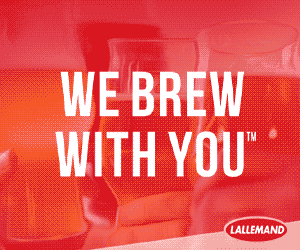Munich Helles
Munich Helles
(5 gallon/19 L, all-grain)
OG = 1.047 FG = 1.011
IBU = 20 SRM = 4 ABV = 4.8%
The bittering hop selected here is the Mittelfrüh-like, daughter of Hallertau Gold, Tradition with a nominal average alpha acid rating of 5.5%. It has gentle fruity notes. However, any other German noble hops would work as well. The flavor and aroma hops are, fittingly, Mittelfrüh.
Ingredients
8.8 lbs. (4 kg) continental Pilsner malt
5.3 oz. (150 g) Weyermann Carahell® malt (10 °L)
5.3 oz. (150 g) Carapils®/Carafoam® malt
5.3 oz. (150 g) acidulated malt (2.25 °L)
5 AAU Tradition hops (60 min.) (0.9 oz./24 g at 5.5% alpha acids)
1.3 AAU Mittelfrüh hops (15 min.) (0.3 oz./9 g at 4.25% alpha acids)
0.9 AAU Mittelfrüh hops (5 min.) (0.2 oz./6 g at 4.25% alpha acids)
White Labs WLP860 (Munich Helles Lager) or Wyeast 2352 (Munich Lager II) or Mangrove Jack’s M76 (Bavarian Lager) yeast
7⁄8 cup corn sugar (if priming)
Step by Step
This recipe uses a multi-step infusion mash. Dough in at around 104 °F (40 °C) for a hydration rest of 15 minutes. Raise the temperature to 122 °F (50 °C) for a protein rest of 15 minutes. Raise the temperature to 149 °F (65 °C) for a beta amylase rest of 30 minutes. Raise the temperature to 162 °F (72 °C) for an alpha amylase rest of 30 minutes. Raise temperature to 169 °F (76 °C) for the mash-out. Recirculate wort and then begin sparge.
Boil for 75 minutes, adding hops as indicated. At the end of the boil, turn off heat and whirlpool for 15 minutes.
Heat-exchange to the high end of the temperature range for the selected yeast. As soon as primary fermentation is vigorous, reduce the tank temperature to the low end of the yeast’s temperature range. After 7 additional days, give the beer a diacetyl rest by raising the tank temperature to 66 °F (19 °C) and hold it there for about 2 days.
Rack and reduce the beer temperature for lagering by 2 °F (1 °C) a day until reaching 31 °F (–1 °C) or close to it, equipment permitting. The lagering temperature should definitely not be higher than 38 °F (3.5 °C). Lager for 4 to 6 weeks. Some brewers may shorten the lagering time to 2 to 4 weeks, others will lengthen it to 12 weeks. Rack again. Carbonate to approximately 2.75 volumes of CO2.
Munich Helles
(5 gallon/19 L, extract only)
OG = 1.047 FG = 1.011
IBU = 20 SRM = 5 ABV = 4.8%
Ingredients
6.6 lbs. (3 kg) Bavarian Pilsner liquid malt extract
1 tsp. 88% lactic acid
5 AAU Tradition hops (60 min.) (0.9 oz./24 g at 5.5% alpha acids)
1.3 AAU Mittelfrüh hops (15 min.) (0.3 oz./9 g at 4.25% alpha acids)
0.9 AAU Mittelfrüh hops (5 min.) (0.2 oz./6 g at 4.25% alpha acids)
White Labs WLP860 (Munich Helles Lager) or Wyeast 2352 (Munich Lager II) or Mangrove Jack’s M76 (Bavarian Lager) yeast
7⁄8 cup corn sugar (if priming)
Step by Step
Start with 5 gallons (19 L) brewing water in your pot. When water reaches 180 °F (82 °C) remove from heat and stir in the malt extract. Turn heat back on once all the extract is dissolved and bring wort to a boil. Boil for 60 minutes, adding hops as indicated. At the end of the boil, turn off heat and whirlpool for 15 minutes.
Heat-exchange to the high end of the temperature range for the selected yeast and top off fermenter to 5 gallons (19 L). As soon as primary fermentation is vigorous, reduce the tank temperature to the low end of the yeast’s temperature range. After 7 additional days, give the beer a diacetyl rest by raising the tank temperature to 66 °F (19 °C) and hold it there for about 2 days.
Rack and reduce the beer temperature for lagering by 2 °F (1 °C ) a day until reaching 31 °F (–1 °C) or close to it, equipment permitting. The lagering temperature should definitely not be higher than 38 °F (3.5 °C). Lager for 4 to 6 weeks. Some brewers may shorten the lagering time to 2 to 4 weeks, others will lengthen it to 12 weeks. Carbonate to approximately 2.75 volumes of CO2.
Written by Horst D. Dornbusch

The bittering hop selected here is the Mittelfrüh-like, daughter of Hallertau Gold, Tradition with a nominal average alpha acid rating of 5.5%. It has gentle fruity notes. However, any other German noble hops would work as well. The flavor and aroma hops are, fittingly, Mittelfrüh.



